Faith and Politics

I struggle to know how much is enough. I hear about Joseph Kony and the many children he’s exploited as child soldiers. I get angry, discouraged. I write about it, talk to friends about it.
And then my life keeps moving and I don’t think about it again for days or weeks.
Trayvon Martin, an unarmed teenager, is gunned down on the street. The nation is divided, both outraged about the killing and fearful of the threat to gun rights and laws of self-defense.
And then we talk about something else.
Today’s issues include the nuns going head-to-head with the Vatican, as well as stories about still more preachers being busted for spousal abuse, or expelled from their jobs because of their sexual orientation.
Tomorrow it will be something else.
Twenty years ago, who would have predicted the 2012 U.S. presidential race would pit a black incumbent against a white Mormon?
"I’ve been black my whole life and a Mormon for 30 years and never thought either of these (candidacies) would happen in my lifetime," says Utah attorney Keith Hamilton.
"This is a day that all Americans should take some solace in — that things are changing. Regardless of who wins, this sends a message to our children."
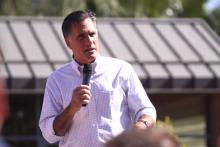
When Romney delivered his “Faith in America” speech in 2007, the Southern Baptist response was to label Mormonism a “theological cult” and “false religion.”
What's surprising in 2012 is the relative lack of anxiety on the other side, among evangelicals who for years considered Mormonism a "cult" that was to be feared, not embraced.
In fact, the relative ambivalence among prominent evangelicals about this new "Mormon moment" -- and the fact that Romney's campaign could mainstream Mormonism right into the Oval Office – could radically shift the dynamics on America's political and religious landscape.
Richard Florida examines how geography impacts abortion in the United States, and what it tells us:
"Few issues divide Americans more severely than abortion. Even accounting for changes in the nation's political climate over time, polling numbers consistently show a close to even split in the percent of the population who identify as pro-life or pro-choice. And given the variation in abortion laws across the 50 states, that divide has a definite geographic dimension as well."
Read the full story here

Those who wish the see the wall of separation between church and state burned down have a rather colorful – if not exactly truthful – spokesperson on their side these days. Evangelical preacher, founder of “WallBuilders Live” and perennial headline grabber David Barton is known for his “out there” claims, but his most recent is a keeper.
Barton is fairly well known for his argument that the notion of separation of church and state is a myth. He, like many fellow conservative Christians, believe that the United States was founded as a Christian nation, and that our founding father intended for this to be a country governed by Christian values, if not specifically Christian leaders.
This, by itself, is not particularly outrageous, at least in the sense that his views are not unique to him. But one of the foundational claims he makes to support his advocacy for Christian nation status is his claim that the Constitution of the United States quotes directly from the Bible.
Come again?
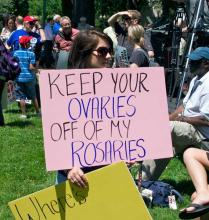
Hundreds gathered on Capitol Hill and at rallies across the nation on June 8 in a double-barreled attack on President Obama's health care law and a mandate to require employers to provide insurance coverage of birth control.
Speakers such as Rep. Michele Bachmann, R-Minn., and anti-abortion activist Lila Rose rallied conservatives in one of 160 coordinated noontime rallies across the country.
Bachmann, a former GOP presidential candidate, emphasized that the fight over the insurance mandate is not about birth control or women's rights, but the freedom to practice religion without government involvement.
“This is about, at its heart and soul, religious liberty first and religious liberty always,” she said. “We will fight this and we will win.”
Monday marked the 93rd anniversary of the congressional passage of the 19th Amendment to the Constitution on June 4, 1919.
After 71 years of movement forward and pushes back, the proposed Amendment to guarantee every woman in the United States the right to vote prevailed in the Senate. But it still had 36 more hurdles to jump before ratification; 36 of the then 48 states had to pass the Amendment in their state legislatures. On August 18, 1920 Tennessee became the 36th state to pass the Amendment and on that day women’s suffrage became the law of the land.
Florida missed that boat. The sunshine state had never voted on the 19th Amendment before it was ratified. A year later, the Florida state legislature passed its own law guaranteeing the vote to all citizens, but Florida’s legislature didn’t actually ratify the 19th Amendment until it took a symbolic vote in 1969.
As a woman I am grateful for the fact that in 1969 someone thought it might be a good idea to at least symbolically say, “Yeah, man, we’re cool with the ladies voting. We can groove with that.” But the current news about Florida’s voter purge has me wondering what happened in the 43 years between Florida’s symbolic thumbs up for suffrage and today’s current voter suppression?
The answer: The year 2000 happened.
Author Jonathan Merritt sets our the seven reasons why Christians should "change their political tune":
Aristotle is credited with saying, "Change in all things is sweet." And perhaps no change of late is as sweet as that among young Christians in the public square. While the last several decades of Christian engagement have often been marked by partisan tactics and a polemical tone, a new generation is changing its political tune. These individuals aren't leaving the public square altogether, but they are looking for less divisive and less partisan ways to engage. They want to follow Jesus without fighting the culture wars.
Read the full list here
Writing for The Daily Beast, Barbie Latza Nadeau and Jesse Ellison examine the rift between nuns across the world:
In the U.S., where the number of religious sisters has dwindled from 179,954 to 57,544 in the past half century, the controversy cuts to the heart of what it means to be a nun. To many non-Catholics, nuns conjure up a vision of the ladies from The Sound of Music. To Catholics, they can be anything from the no-nonsense school teachers who rapped their knuckles during Catechism class to hospital workers who pray at the bedsides of the dying.
Read the full article here

In celebration of its 50th anniversary, Amnesty International has released a new song, "Toast to Freedom," recorded by nearly 50 artists from around the world.
The original tracks for the song were recorded in Levon Helm's famed studio in Woodstock, N.Y., known as "The Barn," where acclaimed artists like the Black Crowes and My Morning Jacket have made recordings and where Helm, a four-time Grammy winner, for years stages his intimate, multi-artist concert performances known as the “Midnight Ramble.” (Helm passed away in April after a long battle with cancer.)
Artists who sing and/or play on the recording includ Kris Kristofferson, Roseanne Cash, Keb Mo, Carly Simon, Marianne Faithful, Donald Fagen (of Steeley Dan), Sunny Landreth, Shawn Mullens, Ewan McGregor (who knew he could sing so nicely?) and the late Mr. Helm himself.
Have a listen to the song and read about the "Electric Burma" concert later this month in Ireland honoring Burmese justice champion Aung San Suu Kyi, where some of the "Toast to Freedom" artists will perform the song live, inside the blog ...

I find myself thinking a lot about maternal mortality (and the issues that surround it, like access to contraception) lately, partly because I’ll soon be moving to a country with one of the world’s most dismal maternal mortality rates, and partly because my husband and I aren’t planning to have more biological children, which means that we’re contracepting for the duration.
Also, Nicholas Kristof and Sheryl WuDunn’s Half the Sky movement is gaining even more visibility — PBS’s Independent Lens is creating a series of short films and some longer features on issues raised in their bestselling, well-worth-reading book even as birth control reemerges again and again as a point of contention between Catholic bishops and nuns, between government policy and religious conviction, and even, as Amy Frykholm as suggested, among evangelicals.
Recently I’ve become aware that unwanted pregnancies are nothing new — certainly not the product of a culture that’s “anti-life” or anti-children, as the new-ish evangelical suspicion of birth control has it. In the 1850s, Mathilde Shillock, a German immigrant settled on the Minnesota frontier wrote,
“God has entrusted us with a son...it seems that his father is happy over it, I myself do not wish for any more children, as I look upon life as a heavy burden. [...] pity is all I can offer [this child]. Pity and a feeling of duty towards him to lighten his blameless fate.”

Families of deceased veterans were shocked and angry last year when religious references were banned from funeral rituals and a Memorial Day service at Houston National Cemetery.
A lawsuit eventually resolved the matter, but a House bill would enshrine in law the lessons learned from that isolated incident.
Such protections already exist as a result of the lawsuit and Bush-era policies that protect families’ free exercise of religion at military funerals. However, the bill filed by Rep. John Culberson, R-Texas, would spell out families' rights to religious expression while curtailing the government’s role.
Matthew Hutson asks an interesting question in an article for The Huffington Post - Are Conservatives More Religious and Liberals More Spiritual?
"In the United States, religion and politics have always been (fitful) bed buddies. But whether faith drives people left or right (or neither) is not obvious. On one hand, there is the Christian right, a demographic epitomized by Jerry Falwell and Pat Robertson that values tradition and authority and opposes gay rights and the teaching of evolution. On the other hand, we owe many of our advancements in civil rights -- a predominantly left-wing cause -- to religious leaders such as Martin Luther King Jr. One way to make sense of the relationship between faith and political orientation is to recognize the difference between religiousness and spirituality."
Read the full piece here
Writing for The Washington Post's On Faith blog, David Mason argues:
"Conservative Christians are starting to line up behind Mormon Republican presidential candidate Mitt Romney. But they’re not doing so comfortably, and not without clinging to a last, non-negotiable condition that, ironically, makes the conservative Christian voting bloc the force most responsible these days for the secularization of America."
Read more here
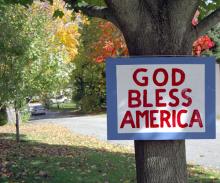
While liberals aren't as guilty of showmanship as conservatives (Keith Olbermann is the exception), they are as guilty of not taking politics seriously. Conservatives often resort to name-calling in the absence of debate, but liberals ignore whole categories of discussion. Like patriotism and religion. I suspect the reason is discomfort with talking about them, and I suspect that that's partly because they don't want to risk sounding like conservatives.
Well, it's time we got over that.

Both Republicans and Democrats have a religion problem and it has nothing to do with same-sex marriage, abortion or religious liberty. Rather it is budgets, deficits, and debt ceiling deadlines that are their serious stumbling blocks.
That’s right, in a city deeply divided between the political right and left there is a growing consensus from religious leaders about getting our fiscal house in order and protecting low-income people at the same time. Together, many of us are saying that there is a fundamental religious principle missing in most of our political infighting: the protection of the ones about whom our scriptures say God is so concerned.
Indeed, the phrase “a budget is a moral document” originated in the faith community, and has entered the debate. But those always in most in jeopardy during Washington’s debates and decisions are precisely the persons the Bible instructs us clearly to protect and care for — the poorest and most vulnerable. They have virtually none of the lobbyists that all the other players do in these hugely important discussions about how public resources will be allocated.
For us, this is definitely not a partisan issue, but a spiritual and biblical one that resides at the very heart of our faith. It is the singular issue which has brought together the U.S. Conference of Catholic Bishops, the National Association of Evangelicals, the Salvation Army, and the leaders of church denominations, congregations, and faith-based organizations across the nation.
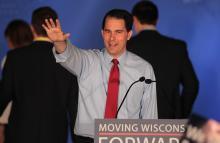
The votes are counted, the concession speeches made, the victory parties had. Wisconsin, a word that has become as synonymous with divisive politics as it is for cheese and beer, is done with the recalls.
In the end, some change was made. Between the first round of recalls and yesterday’s election, the senate has shifted from Republican to Democratic control. And yet, not much has changed. We still have a union-busting governor and a climate change doubter as lieutenant governor.
The calls, from politicians and citizens, have been pretty consistent. It is time to move forward. It is time to put aside our divisions and find a way to govern together. It is time of our state to heal.
Whatevs.
See, I’m not all that interested in moving forward – not because I like the fighting or because I think it is healthy to be so divided that the mere mention of politics in casual conversation makes blood pressures boil.
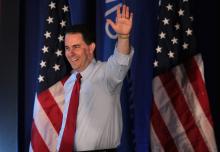
Scott Walker has survived. His intent to divide and conquer worked. First he sought to divide public workers – teachers and others from police and firefighters. This did not work. He sought to separate public employees from “taxpayers,” as if public employees are not also taxpayers. He brought South Carolina Gov. Nikki Haley to campaign for him. She boasted of being a union buster. So-called “right to work” is a pillar of conservative Republican politics.
Keli Goff asks is America would be better off with an agnostic President:
I"t's always refreshing when religious leaders strive to embody the very best values their faith has to offer. I have been reminded of this often over the past year, which is shaping up to be banner one for Christian leaders in the "practice what you preach" department."
Read her full article here

A group of Catholic monks who sued for the right to sell handmade caskets will head back to court this week, fending off an appeal from the state funeral industry after a federal judge last year struck down a state law that permitted only licensed funeral directors to sell coffins.
Three members of the 5th U.S. Circuit Court of Appeals will hear arguments June 7 n the case of the monks of St. Joseph Abbey versus Louisiana funeral homes.
The monks wanted to sell handmade cypress caskets that are made at their wood shop without paying the expensive fees and meeting the stringent requirements to obtain certification from the Louisiana Board of Embalmers and Funeral Directors. The abbey has said it counts on the casket sales to help finance medical and educational needs for more than 30 monks.
Last July, U.S. District Judge Stanwood R. Duval ruled that the state statute unfairly shielded a funeral industry monopoly to the detriment of consumers.